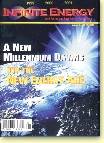 |
Critics Kill Prof. George Miley's Historic
U.S. DOE Low-Energy Nuclear Reactions Contract
(Published November, 1999 In Infinite
Energy Magazine Issue #28)
Compiled by Dr. Eugene Mallove
Read the Issue No. 27 Article here.
In Issue No. 26 of Infinite Energy, we reported
that Prof. George Miley's Low- Energy Nuclear Reactions (LENR) Group
at the University of Illinois had been awarded a peer-reviewed U.S.
Department of Energy contract— for an experimental study to verify
previously tested electrolytic techniques to remediate radioactive
nuclides. In Issue No. 27, we reported that Miley's grant was in
danger of being eliminated by a chorus of cold fusion critics who
protested to DOE officials about the award. The critics have now
succeeded in getting the Miley grant killed.
Miley's funding of approximately $100,000 has been
eliminated by DOE before one penny of it was transferred to the
University of Illinois. A secret "review" of the science behind
the award by an unnamed panel of six individuals (increased
for some unknown reason from the original three panelists) did the
killing. Other universities winning these NERI— Nuclear Energy
Research Initiative— awards have received their funding already.
Infinite Energy's Eugene Mallove maintains
regular contact with U.S. Senator Bob Smith's office, keeping Senator
Smith and his advisors apprised of the current state of the cold
fusion field. In this instance Senator Smith obliged with a thoughtful
letter to the DOE, advising them not to be "closed to new ideas
and approaches." We reprinted his July letter in our last issue.
The DOE official, William D. Magwood, IV, who caved in and lowered
the boom on Miley's grant, responded to Senator Smith with the following
vacuous letter:
Dear Senator Smith:
Thank you for your letter of July 28, 1999, to
Mr. John C. Angell, expressing the concern of Dr. Eugene Mallove,
Editor-in-Chief, Infinite Energy Magazine, over an article
in the July issue of Science magazine stating that the Department
of Energy is taking extraordinary measures to review a grant made
to professor George Miley of the University of Illinois. You encouraged
the Department to reconsider placing "additional impediments" in
the way of this research project. Your letter was forwarded to the
Office of Nuclear Science and Technology for reply.
The proposal in question, selected for negotiation
of an award under the Nuclear Energy Research Initiative (NERI)
is entitled Scientific Feasibility Study of Low Energy Reactions
for Nuclear Waste Amelioration. This proposal was first reviewed
by a peer review panel in the field of nuclear waste technology
as identified in the proposal. We believe this review was appropriate.
However, the unique and crosscutting nature of this proposal prompted
us to conduct a further evaluation of the proposal by six independent
peer reviewers specializing in the fundamental sciences, appointed
by the Department's Office [sic] Science. This review, completed
on September 7, 1999, did not recommend that this proposal be funded.
As a result, there will not be a NERI award for this proposal in
fiscal year 1999.
We hope this answers the questions raised in your
letter. Please contact us any time if you have any further questions.
Sincerely,
William D. Magwood, IV, Director
Office of Nuclear Energy, Science and Technology
As this issue of Infinite Energy goes to press,
we are in direct contact with Ms. Hope Williams of the DOE's publicity
office, in an attempt to have at least two major questions answered
about this travesty: (1) Did the impetus to have Miley's grant reviewed
come from outside the DOE or from within? and (2) What are the names
and affiliations of the six panelists who killed the contract? DOE
policy prohibits DOE managers from talking to the press without
clearance by the DOE press office.
As reported in my last month's "Breaking Through"
editorial, we have solid information from a DOE insider that one
of the six panelists was Dr. John Huizenga of the infamous 1989
DOE ERAB Cold Fusion Panel. Huizenga could hardly be considered
an unbiased reviewer. We wonder who were the other review panel
participants. David Malakoff's article in Science, (September
24, 1999, "Thumbs Down," p. 2043) reports that "six new reviewers
recommended that DOE spend its money elsewhere." According to an
e-mail from Malakoff to Miley, this was a unanimous decision. NERI's
John Herczeg notes to Science, "We'll be taking a closer
look from now on."
Thus does a Federal bureaucracy work— quaking
in its bureaucratic pants at the slightest whiff of "political embarrassment"
threatened by the high-priests of official science. One would have
hoped that "the unique and crosscutting nature of this proposal"
referred to by Magwood in his letter would have made this a prized
piece of research work that might have led to a window on revolutionary
science and technology. Not so. The Federal government wants uniformity
and incrementalism in its wasteful DOE funding.

|

